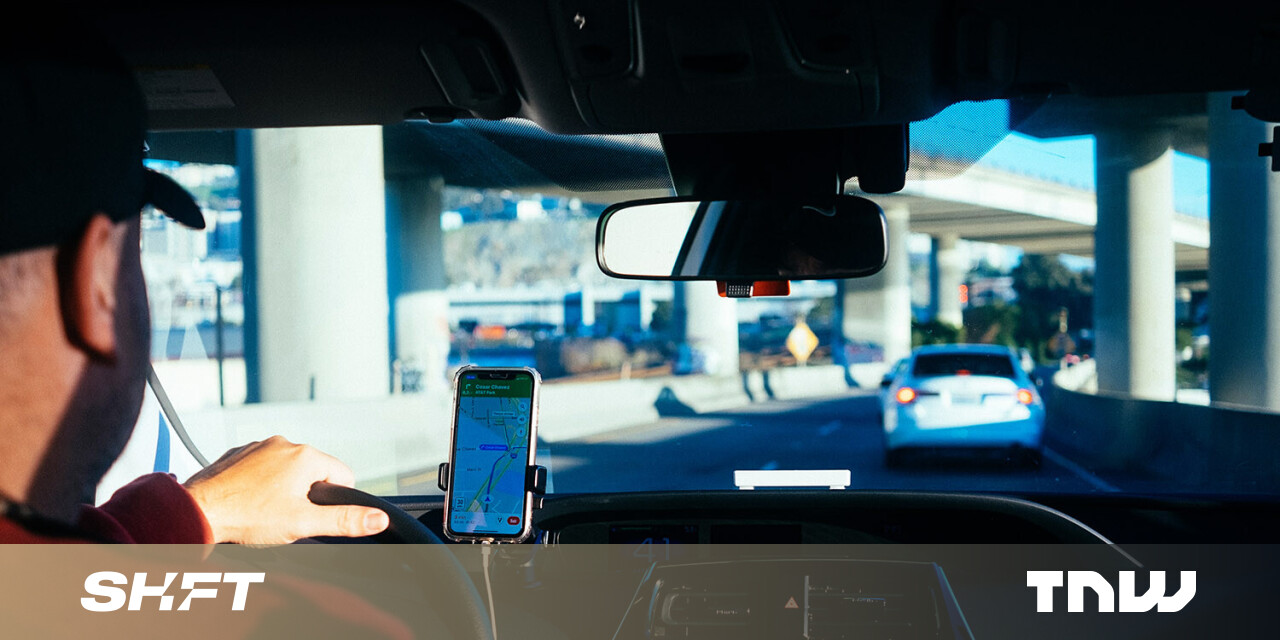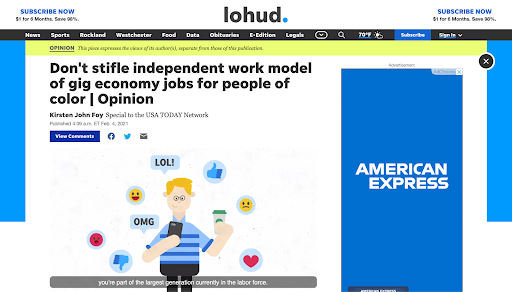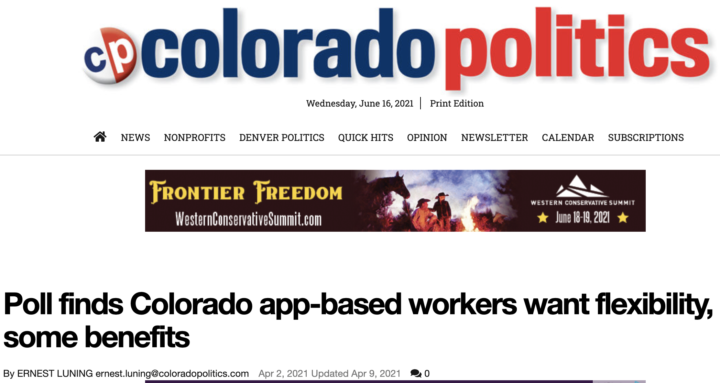#Uber and Lyft donated to community groups who pushed their agenda

Table of Contents
“#Uber and Lyft donated to community groups who pushed their agenda”
One week later the exact same op-ed was published in the bilingual El Dia Newspaper. Two months later, a version of it appeared again in Crain’s Chicago Business newspaper.
Similar articles and op-eds riffing on the theme of “protecting” independent work have popped up in local publications all over the country, from Colorado to Massachusetts to New Jersey to New York.
In some of these states the articles have a common thread: Their authors represent organizations that serve communities of color and have received recent donations from Lyft, and in some cases Uber or DoorDash.
The op-eds are one facet of a multimillion-dollar lobbying campaign aimed at fighting regulations that would require the companies to treat drivers and delivery workers as full-fledged employees. Over the past several months, news outlets have detailed political action committees set up by Uber and Lyft in New York and Illinois. The Markup found that the practice was even wider spread, occurring in other states and often involving alliances with local community groups.
According to public records obtained by The Markup, Lyft set up various types of political committees in Illinois, Massachusetts, New York, and Washington. Uber formed one super PAC in New York. Combined, the companies contributed a total of more than $3 million to the committees. Along with paying several public relations and lobbying firms through those committees, the companies also made donations to more than 30 local organizations that work with communities of color, according to an analysis by The Markup of the four states’ lobbying disclosure filings. A few of those organizations are behind the op-eds, which feed into the companies’ narrative that the fight for “independent work” is an organic grassroots movement waged by people of color.
“Race is a key technology that is being used to signal a kind of progressivism that will allow these companies get around their class and race exploitation,” said Chenjerai Kumanyika, an assistant professor of journalism and media studies at Rutgers University who focuses on the intersection of social justice and popular culture. “They’re happy to say ‘Black Lives Matter’ as long as that means their workers don’t form a union.”
When asked about its lobbying, Lyft spokesperson Julie Wood said in an email, “Lyft is committed to working with stakeholders who are interested in advancing innovative policy solutions that make sense for drivers.” Uber spokesperson Kayla Whaling said, “Our teams are continuing to collaborate with different state and local policymakers, as well as third parties to understand their priorities that support a modern policy framework for independent work.”
Over the past year, Uber and Lyft have run ad campaigns, written blog posts, and pledged to do more to further racial justice. Lyft announced it was celebrating Juneteenth as an official holiday and touted its LyftUp program, which it says provides “free or discounted rides to communities of color.” In May, Uber said it was “reaffirming our commitment to being an anti-racist company” with several initiatives to “fight against racism and inequality,” such as developing anti-racism trainings and making it easier to report discrimination through the app.
According to Lyft’s 2021 economic impact report, 69 percent of its drivers are from racial or ethnic minority groups. Uber hasn’t released recent statistics, but a 2015 report cited at least 55 percent of its U.S. driver workforce as people of color.
The companies’ lobbying tactics in Illinois, New York, and the other states are reminiscent of their successful $205 million campaign to pass California’s Proposition 22. The ballot measure exempted the companies from a state law that required them to give drivers and delivery workers employee benefits and at least minimum wage pay. In the run-up to last November’s vote, the gig economy companies paid $95,000 to a small firm run by Alice Huffman, then president of the NAACP’s California chapter, who subsequently wrote op-eds in local Black newspapers advocating that drivers should be classified as independent contractors.
These types of payments have caught the attention of some of Uber’s and Lyft’s shareholders. The Teamsters General Fund, an investor in both companies, proposed resolutions at both companies’ annual shareholder meetings this year that would require more transparency around their lobbying practices, including how much money they’ve spent directly and indirectly and their “grassroots lobbying.” The vote on Lyft’s resolution is scheduled for Thursday, June 17, the publication date of this story.
“It’s like social justice greenwashing,” said Mark Smithivas, a former Uber driver who’s an organizer with the driver advocacy group Independent Drivers Guild Chicago.
While the gig economy companies worked to pass Proposition 22 in California, they also set their sights on other states with similar regulatory battles.
The strategy in Illinois and New York
In Illinois and New York, the crux of Lyft’s and Uber’s strategy involved joining forces with community groups and business associations to create a “coalition for independent work” that publicly advocates keeping drivers as independent contractors and doesn’t disclose spending or funding. (Postmates, which is owned by Uber, and Instacart and DoorDash are also listed as members of the coalitions examined by The Markup.)
“We understand that each state has different needs and we’re committed to continuing to work with a diverse group of stakeholders across the country to find tailored solutions that work for each community,” Natalia Montalvo, an Instacart spokesperson, said in an email. Campbell Matthews, a DoorDash spokesperson, also said that company is working with several community groups and “if The Markup is suggesting that any advocacy group is in some way inauthentic or pretending to care about its community, that would be very disrespectful to efforts these organizations pursue.”
The Markup identified six op-eds by organizations that advocated for the coalitions’ agendas and had received money from either Lyft, Uber, or DoorDash, as revealed through state public records or the organizations’owndisclosures on their websites. The Markup also found what appear to be six press releases from the coalitions that were republished verbatim or almost verbatim in local Black and Latino newspapers or other news sites, with some translated into Spanish; they were not identified as press releases.
Illinois is a good example of how the process works. Illinois representative Will Guzzardi has been working since early 2020 on introducing a bill in the state that could classify gig workers as employees and “force Big Tech to treat their workers fairly.”
Last summer, Lyft’s head of external affairs, Jordan Markwith, registered a super PAC called Illinoisans for Independent Work (IFIW), according to public records. Joining Markwith on the super PAC’s filing forms was Darrin Lim, the co-founder of Politicom Law, a firm that specializes in “multi-state political law challenges” for large companies. Neither Markwith nor Lim responded to requests for comment.
A week after the super PAC was registered, Lyft infused the group with $1.2 million. And then Illinoisans for Independent Work started spending.
Since July 2020, IFIW has spent almost a million dollars on consulting firms—totaling nearly half the sum Lyft spent on federal lobbying in 2020, according to the Center for Responsive Politics. And, notably, the filings show that on Oct. 23, IFIW also sent small donations to 33 nonprofit organizations and business associations in sums ranging from $2,500 to $5,000.
In January, articles and op-eds by some of those groups started appearing in local Black and Latino newspapers and other new sites announcing the Illinois Coalition for Independent Work. Lyft, as well as four of the organizations that received small donations from the Illinois super PAC, were listed among the coalition’s founding members. Those four included The Black Star Project and Social Change, as well as the Illinois State Black Chamber of Commerce and Illinois Hispanic Chamber of Commerce—the groups behind the op-eds in The Chicago Crusader, El Dia Newspaper, and Crain’s Chicago Business.
The Illinois Coalition for Independent Work and those four organizations didn’t respond to requests for comment.
“They are using the facade of racial justice to obscure what they are actually doing, which is creating laws to subordinate low-wage workers,” said Veena Dubal, an employment labor law professor at the University of California Hastings College of the Law, who studies race and the gig economy. “They are doing it in these very targeted ways, like setting up PACs and targeting immigrant constituents in the places where [those constituents] feel most comfortable and where they get their information, like community newspapers and community groups.”
In New York, where an Uber- and Lyft-backed deal to introduce a gig work bill in the state fell through earlier this month, the pattern was similar. As previously reported by Vice, Lyft set up a New York super PAC called New Yorkers for Independent Work in May of last year. Markwith and Lim were listed as the committee chair and treasurer in the initial filing forms. Lyft injected the New York super PAC with a total of $1.1 million.
The super PAC has paid nearly half a million dollars to consulting firm Mercury Public Affairs, a self-described “high-stakes public strategy firm” that was previously caught trying to place a driver op-ed in LA Weekly on behalf of Uber in 2014. According to public records, Lyft’s super PAC paid Mercury for things like digital advertising and campaign mailers. Some of those campaign mailers supported candidates for the New York State Assembly. The super PAC also paid more than $500,000 to consulting firm Renaissance Campaign Strategies, a firm with no internet presence that happens to list the same address in public records as Mercury Public Affairs’ Tampa office. Renaissance Campaign Strategies could not be reached for comment.
“We are a public affairs firm and we engage in public affairs campaigns for our clients,” John Gallagher, a partner at Mercury Public Affairs, said in an email.
At the same time that Lyft’s New York super PAC was getting off the ground, Uber was setting up its own super PAC in the state, called New Yorkers for Flexible Work. The company contributed $111,000 to the committee.
“As we have made clear, we believe independent work can and should be improved,” said Whaling, the Uber spokesperson. “We recognize that each state has unique needs and priorities.”
In December, Spectrum News 1 reported on the formation of the New York Coalition for Independent Work. The coalition currently lists 46 members, including Lyft, Uber, NAACP, 100 Hispanic Women, and the National Action Network, which is a civil rights organization founded by the Rev. Al Sharpton. The NAACP, 100 Hispanic Women, and the National Action Network didn’t respond to requests for comment.
After that, op-eds started popping up. New York’s Black Star News published a piece in April, which didn’t have a byline, about Haitian New Yorkers backing app-based work; and in February, one of the founding members of the coalition, the community group Arc of Justice, run by Elder Kirsten John Foy, wrote an op-ed titled, “Don’t Stifle Independent Work Model of Gig Economy Jobs for People of Color” in Lohud, a New York news site that’s part of the USA Today Network. As first reported by Techworker, the Arc of Justice website lists Uber and Mercury Public Affairs as “benefactors.” The Arc of Justice didn’t respond to a request for comment.

Colin Benjamin, managing editor for The Black Star News, said in an email that the news site doesn’t promote any particular employer and it “will always stand with working people.”
“The Black Star News, besides being pro-worker and pro-union, is also pro-immigrant.… We are not oblivious to the economic situations our people face in capitalist America, or to the exploitative conditions they have to navigate in,” Benjamin said. “Our number one priority is for all workers to have full rights and benefits, and the ability to unionize. So, if any such workers have issues with us publishing the press release we will gladly hear them out and publish their views.”
Not all of the groups listed on coalition websites actually agreed to be members. The corporate and government watchdog Public Accountability Initiative obtained emails showing several groups never agreed to be listed as members of the New York Coalition for Independent Work. After an email exchange in March, four groups—Groundwork Buffalo, PUSH Buffalo, Open Buffalo, and Coalition for Economic Justice—were removed from the coalition’s website.
Beth DeFalco, a spokesperson for both New York’s and New Jersey’s coalitions for independent work, said these groups were brought on by an outside consultant and “there has never been any intention to list groups on the website that weren’t part of the coalition.”
Variations on a theme in Massachusetts, Colorado, and New Jersey
The gig economy companies’ lobbying in Massachusetts, Colorado, and New Jersey followed a similar playbook. They set up coalitions that focused more on traditional public relations techniques and only in some cases promoted op-eds by community groups.
In Massachusetts, where the state attorney general has sued Uber and Lyft, aiming to force the companies to classify their drivers as employees, Lyft incorporated a super PAC called Bay Staters for Independent Work. Again, Markwith and Lim were listed on the original filings. But then the super PAC sat dormant for nearly two months before dissolving in October 2020. Several months later, in March, the Boston Business Journal reported the launch of the Massachusetts Coalition for Independent Work. The coalition lists fewer local community organizations than those in Illinois and New York, and the articles written on its behalf tend to be about polls commissioned by the companies and first-person accounts by drivers about how much they like the “flexibility” of their jobs.
“The Massachusetts Coalition for Independent Work exists to support these drivers and amplify their voice at the State House,” Conor Yunits, a spokesperson for the coalition, said in an email. “Our Coalition members and partners represent a variety of industries and different perspectives, but all are committed to a legislative solution for drivers that expands opportunity, strengthens equity, helps the economy, and benefits communities across the Commonwealth.”
Neither Colorado nor New Jersey appear to have political committees formed by Lyft or Uber, according to a Markup review of public records, but the gig economy companies did create coalitions in both states.
In April, a press release from Hilltop Public Solutions—a firm that specializes in “grasstops solutions” and helps “clients inject their voices into local policy debates”—trumpeted the launch of the Colorado Coalition for Independent Work. As in Massachusetts, the Colorado coalition listed fewer community organizations, and what’s showing up in the local papers are driver op-eds and articles about the commissioned polls. A gig worker law that would exempt Uber and Lyft from providing workplace benefits in the state failed to pass in 2018, but driver advocates believe another iteration of that bill could emerge.

Hilltop Public Solutions didn’t respond to a request for comment, but Sharon Páez, a spokesperson for the Colorado Coalition for Independent Work, who’s listed as a partner at Hilltop, said in an email that the coalition “lifts up diverse worker voices so stakeholders understand that they want to earn an income on their own terms” and that it welcomes partners “in our efforts to expand opportunities for workers across all demographics, ethnicities and backgrounds.”
New Jersey has seen heated debate over gig worker classification. A slew of bills giving workers more rights was signed by the governor last year, and the state is awaiting a vote on another bill that could classify gig workers as employees. In February, Uber, Lyft, and the other gig economy companies officially launched their coalition in the state, New Jersey Coalition for Independent Work, which was announced in a press release put out by Mercury Public Affairs.
Local organizations that are members of the coalition have published op-eds touting “flexible” gig work. While it’s unclear if all the members received donations from the companies, at least two of the community organizations list at least one of the gig economy companies as a sponsor or member.
DeFalco, the spokesperson for the New York and New Jersey coalitions, said the coalitions were “assembled through the work of various members, outside community consultants, and others” and that members are encouraged to be vocal about “protecting worker flexibility and independence.”
One of those organizations is the Urban League of Essex County, a community organization that provides services like financial counseling and early childhood education to disadvantaged residents. In late March, NorthJersey.com published an op-ed by Vivian Cox Fraser, the organization’s CEO. In it, she said app-based work empowered women of color, and she urged state lawmakers to “protect” independent work. A month later, DoorDash sponsored the Urban League’s annual gala on a “champion” level of $5,000, according to its website. The Urban League of Essex County didn’t respond to a request for comment.
Matthews, the DoorDash spokesperson, said the company’s “presence at the virtual gala enabled us to further connect with the communities the Urban League supports, such as those seeking low-barrier to entry earning opportunities as well as small businesses,” and that the investment was part of a “long-term partnership” with the National Urban League.
“It’s a proactive attempt to cloak themselves in racial justice … and creates a political environment where they cannot be accused of racism because they have created allies in minority communities,” said Dubal, the Hastings law professor. “It’s like saying, ‘I have a black friend.’ ”
Traditional lobbying practices
In Washington State, Uber and Lyft have tussled with regulators over gig worker laws for years. Lyft’s strategy in the state has taken a more traditional lobbying form. It set up a continuing political committee called Washingtonians for Independent Work, listing Markwith and Lim on the initial filings. Then Lyft imbued it with $1.2 million.
From that coffer, Lyft donated $259,000 to the East King County Jobs Enterprise Washington PAC with both cash and in-kind donations, according to the Washington Public Disclosure Commission. The East King County PAC, in turn, spent down that money supporting the reelection campaign of state senator Mark Mullet, who’d previously sponsored legislation backed by Lyft and Uber. Neither the East King County Jobs Enterprise Washington committee nor Mullet responded to requests for comment.
These sorts of “gray money” groups—“super PACs that disclose other PACs as donors”—create a mountain of campaign finance filings to dig through to find the actual donors, making it difficult for the public to understand who is funding what races.
The Markup found state incorporation documents for a Washington Coalition for Independent Work but no public-facing coalition in the state. The initial board of directors included Abby Majlak, Instacart’s director of government affairs, and John Horton, DoorDash’s head of public engagement. Lim was listed as the incorporator.
Along with state-level lobbying, the gig economy companies have also formed a national coalition with similar aims, the App-Based Work Alliance. This group is focusing on federal legislation around worker classification, like the Protecting the Right to Organize Act (the PRO Act)—a bill that would make it easier for gig workers to unionize. Whitney Mitchell Brennan, spokesperson for the group, said the alliance gives gig workers “a platform to make their voices heard and tell lawmakers why they want to remain independent contractors.” In the first quarter of 2021, members of the alliance spent more than a million dollars lobbying the federal government, according to The Intercept.
Both Uber and Lyft recommended their investorsvote against the proposed shareholder resolutions requiring the companies to be more transparent about lobbying spending. While the vote on the Lyft resolution is happening Thursday, only 30 percent of Uber’s shareholders voted for the resolution at that company’s annual meeting on May 11. The Teamsters General Fund has indicated it may refile the resolution again next year.
“What we don’t know about could actually hurt us,” said Louis Malizia, the assistant director of the Teamsters’ capital strategies department. “Too often what we’re seeing with these quote-unquote ‘grassroots campaigns’ is that they are being run by well-seasoned political operatives, PR firms, or PR professionals. They are not the grassroots activism that they’re being portrayed as.”
This article by Dara Kerr and Maddy Varner was originally published on The Markup and was republished under the Creative Commons Attribution-NonCommercial-NoDerivatives license.
If you liked the article, do not forget to share it with your friends. Follow us on Google News too, click on the star and choose us from your favorites.
For forums sites go to Forum.BuradaBiliyorum.Com
If you want to read more like this article, you can visit our Technology category.




